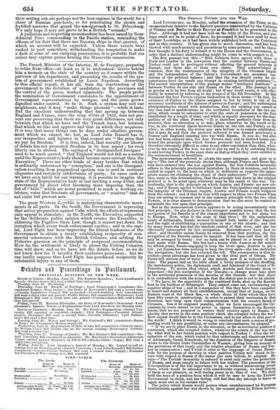The French Minister of the Interior, M. de Persigny, preparing
to retire from office—at least so it is understood—leaves behind him a memoir on the state of the country as it comes within the purview of his department, and presenting the results of the sys- tem of government established by Louis Napoleon. According to this official report, it has all, from the construction of the government to the dictation of candidates in the provinces and the control of the press, worked admirably. The people prefer the nomination of Government candidates to the appointment of Government representatives by intrigue, and the press grow s dignified under control. So be it. Such a system may suit our neighbours, and it may "make things pleasant "—while it lasts. But the excellent understanding that has sprung up between England and France, since the coup d'etet of l852, does not pre- vent our perceiving that there are very great differences, not only between that which we have and the French have, but between that which we like and approve and that in which they acquiesce. It is true that many things can be done under absolute govern- ment which we cannot do ; but, as Lord John Russell has it, our incapacities and failures in that respect are " the price that we pay for freedom." It is true, indeed, that recently our liberty a debate has not presented freedom in its best aspect ; for even liberty can be abused. The saying of a "distinguished foreigner" used to be much quoted, "that England would not fall as a nation until the Representative body should become more corrupt than the Executive." There are other kinds of decay besides that which is ordinarily understood by "corruption," and one is the disorgani- zation resulting from pragmatical egotism run to seed in sectional oliqueries and crotchety subdivisions of party. In cases such as we have seen lately for our warning, it is possible to imagine the state of the Representative body at last inviting a coup d'etat, and government by direct edict becoming more imposing than the list of "bills" which are never permitted to reach a working ex- istence, votes that frustrate all government, or " resolves" that do not-cause but prevent acts.


































 Previous page
Previous page